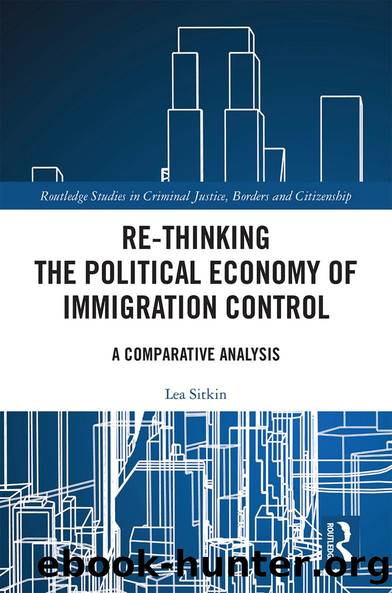Re-thinking the Political Economy of Immigration Control by Lea Sitkin

Author:Lea Sitkin [Sitkin, Lea]
Language: eng
Format: epub
Tags: Social Science, General, Criminology
ISBN: 9781317308348
Google: qvqzDwAAQBAJ
Barnesnoble:
Goodreads: 49510064
Publisher: Routledge
Published: 2019-10-01T00:00:00+00:00
In turn, all other things being equal, classic economic analysis predicts that these dynamics tend to squeeze out the employment of low-skilled workers in coordinated market economies because low skilled workers are not as productive as the cost of higher wages need them to be to justify their employment. These outcomes are positive insofar as they limit wage inequality and working poverty. However, it also means that there are fewer of the jobs that immigrants have typically congregated, particularly at the beginning of their working lives in their host countries.8 As Dahlstedt and Bevelander (2010) argue, high unionisation and collective bargaining create a compressed wage structure that prevents immigrants from competing on the labour market with lower wages. The relationship between the size of low-wage markets and the employment prospects of immigrants is corroborated in a number of studies. For instance, Kogan (2006), which controlled for ethnic origin, age and level of schooling, found that unemployment disparities across 14 EU countries between recent non-European immigrants and natives were smaller in countries with larger low-wage markets. Similarly, Fleishmannâs study of 13 destination countries across the EU, which controlled for age, education, language and citizenship, found that immigrants have lower unemployment rates in countries with larger numbers of low-wage jobs. These dynamics also relate back to Devitt (2011), who argued that variation in the level of economic immigration between countries is driven by variation in the size of the low-paid, low-skilled labour market, amongst other factors. Quite simply, people are more likely to immigrate when there is likely to be a job waiting for them at the other end.
Another possible reason identified within the literature for variation in unemployment disparities between native and immigrant workers across the varieties of capitalism is variation in the level of employment protection. Employment protection refers to the regulatory regime governing firmâs ability to hire and fire workers (Barone, 2001). Coordinated and Mediterranean market economies have higher levels of employment protection than liberal market economies (see Table 5.3) â an outcome that both reflects and constitutes the relative strength of institutions designed to articulate core workersâ interests within the policy-making process.
A great deal of literature exists concerning the relationship between employment protection and overall unemployment rates. Throughout the 1990s, as a number of European countries faced high unemployment whilst deregulated USA underwent a period of significant jobs growth, questions arose as to the relationship between strict employment protection legislation (EPL) and high aggregate unemployment rates (Lazear, 1990). The argument posed by neoliberals was that high employment protection disincentivised employers from creating new jobs. Whilst this relationship has been refuted in a number of studies (Addison et al., 2000), questions remain regarding the impact of strict EPL on unemployment rates among labour market outsiders, a category which includes both young people and/or newly arrived immigrants. The argument here is that whilst strict EPL protects existing workers, it simultaneously makes employers more cautious about hiring new workers through making it more difficult to fire someone (Blau and Kahn, 1999)9
Download
This site does not store any files on its server. We only index and link to content provided by other sites. Please contact the content providers to delete copyright contents if any and email us, we'll remove relevant links or contents immediately.
Cecilia; Or, Memoirs of an Heiress — Volume 1 by Fanny Burney(32527)
Cecilia; Or, Memoirs of an Heiress — Volume 2 by Fanny Burney(31928)
Cecilia; Or, Memoirs of an Heiress — Volume 3 by Fanny Burney(31915)
The Great Music City by Andrea Baker(31898)
We're Going to Need More Wine by Gabrielle Union(19020)
All the Missing Girls by Megan Miranda(15888)
Pimp by Iceberg Slim(14464)
Bombshells: Glamour Girls of a Lifetime by Sullivan Steve(14037)
For the Love of Europe by Rick Steves(13814)
Talking to Strangers by Malcolm Gladwell(13330)
Norse Mythology by Gaiman Neil(13314)
Fifty Shades Freed by E L James(13215)
Mindhunter: Inside the FBI's Elite Serial Crime Unit by John E. Douglas & Mark Olshaker(9289)
Crazy Rich Asians by Kevin Kwan(9261)
The Lost Art of Listening by Michael P. Nichols(7475)
Enlightenment Now: The Case for Reason, Science, Humanism, and Progress by Steven Pinker(7287)
The Four Agreements by Don Miguel Ruiz(6728)
Bad Blood by John Carreyrou(6599)
Weapons of Math Destruction by Cathy O'Neil(6248)
